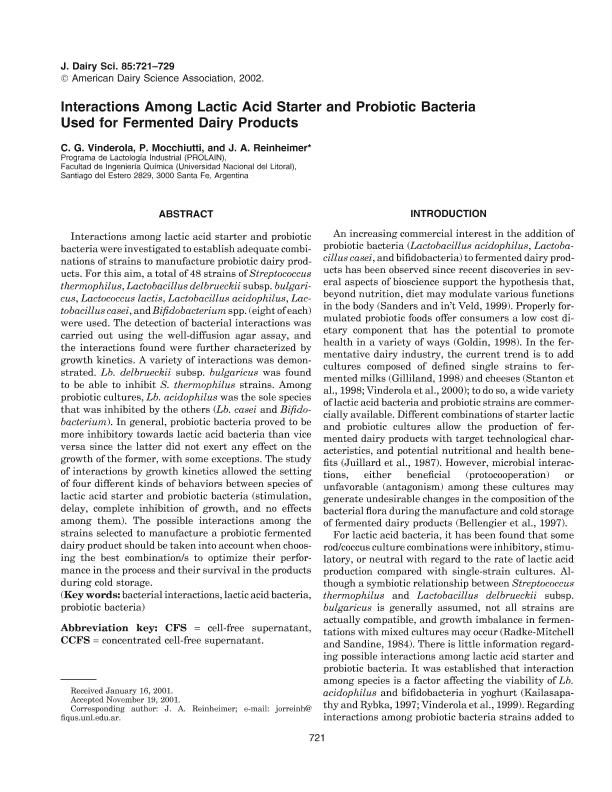Mostrar el registro sencillo del ítem
dc.contributor.author
Vinderola, Celso Gabriel

dc.contributor.author
Mocchiutti, Paulina

dc.contributor.author
Reinheimer, Jorge Alberto

dc.date.available
2018-11-09T22:03:20Z
dc.date.issued
2002-04
dc.identifier.citation
Vinderola, Celso Gabriel; Mocchiutti, Paulina; Reinheimer, Jorge Alberto; Interactions among lactic acid starter and probiotic bacteria used for fermented dairy products; American Dairy Science Association; Journal of Dairy Science; 85; 4; 4-2002; 721-729
dc.identifier.issn
0022-0302
dc.identifier.uri
http://hdl.handle.net/11336/64177
dc.description.abstract
Interactions among lactic acid starter and probiotic bacteria were investigated to establish adequate combinations of strains to manufacture probiotic dairy products. For this aim, a total of 48 strains of Streptococcus thermophilus, Lactobacillus delbrueckii subsp. bulgaricus, Lactococcus lactis, Lactobacillus acidophilus, Lactobacillus casei, and Bifidobacterium spp. (eight of each) were used. The detection of bacterial interactions was carried out using the well-diffusion agar assay, and the interactions found were further characterized by growth kinetics. A variety of interactions was demonstrated. Lb. delbrueckii subsp. bulgaricus was found to be able to inhibit S. thermophilus strains. Among probiotic cultures, Lb. acidophilus was the sole species that was inhibited by the others (Lb. casei and Bifidobacterium). In general, probiotic bacteria proved to be more inhibitory towards lactic acid bacteria than vice versa since the latter did not exert any effect on the growth of the former, with some exceptions. The study of interactions by growth kinetics allowed the setting of four different kinds of behaviors between species of lactic acid starter and probiotic bacteria (stimulation, delay, complete inhibition of growth, and no effects among them). The possible interactions among the strains selected to manufacture a probiotic fermented dairy product should be taken into account when choosing the best combination/s to optimize their performance in the process and their survival in the products during cold storage.
dc.format
application/pdf
dc.language.iso
eng
dc.publisher
American Dairy Science Association

dc.rights
info:eu-repo/semantics/openAccess
dc.rights.uri
https://creativecommons.org/licenses/by-nc-sa/2.5/ar/
dc.subject
Bacterial Interactions
dc.subject
Lactic Acid Bacteria
dc.subject
Probiotic Bacteria
dc.subject.classification
Alimentos y Bebidas

dc.subject.classification
Otras Ingenierías y Tecnologías

dc.subject.classification
INGENIERÍAS Y TECNOLOGÍAS

dc.title
Interactions among lactic acid starter and probiotic bacteria used for fermented dairy products
dc.type
info:eu-repo/semantics/article
dc.type
info:ar-repo/semantics/artículo
dc.type
info:eu-repo/semantics/publishedVersion
dc.date.updated
2018-07-23T18:13:33Z
dc.identifier.eissn
1525-3198
dc.journal.volume
85
dc.journal.number
4
dc.journal.pagination
721-729
dc.journal.pais
Estados Unidos

dc.journal.ciudad
Champaign
dc.description.fil
Fil: Vinderola, Celso Gabriel. Consejo Nacional de Investigaciones Científicas y Técnicas. Centro Científico Tecnológico Conicet - Santa Fe. Instituto de Lactología Industrial. Universidad Nacional del Litoral. Facultad de Ingeniería Química. Instituto de Lactología Industrial; Argentina
dc.description.fil
Fil: Mocchiutti, Paulina. Consejo Nacional de Investigaciones Científicas y Técnicas. Centro Científico Tecnológico Conicet - Santa Fe. Instituto de Lactología Industrial. Universidad Nacional del Litoral. Facultad de Ingeniería Química. Instituto de Lactología Industrial; Argentina
dc.description.fil
Fil: Reinheimer, Jorge Alberto. Consejo Nacional de Investigaciones Científicas y Técnicas. Centro Científico Tecnológico Conicet - Santa Fe. Instituto de Lactología Industrial. Universidad Nacional del Litoral. Facultad de Ingeniería Química. Instituto de Lactología Industrial; Argentina
dc.journal.title
Journal of Dairy Science

dc.relation.alternativeid
info:eu-repo/semantics/altIdentifier/url/https://www.sciencedirect.com/science/article/pii/S0022030202741295
dc.relation.alternativeid
info:eu-repo/semantics/altIdentifier/doi/http://dx.doi.org/10.3168/jds.S0022-0302(02)74129-5
Archivos asociados
